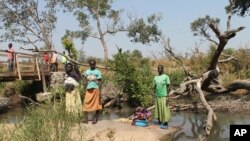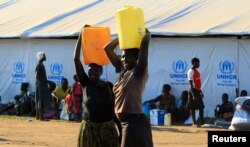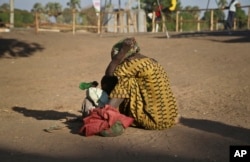South Sudanese women in Uganda say they have found a way to support each other amid tough financial times.
The idea can be traced to the South Sudanese concept of “sanduk,” or box. It's an arrangement under which each member of a group of women contributes a small amount of money monthly, collected by the group's treasurer. All the cash is given to one member of the group each month. The same exercise is repeated the following month for a different group member. It continues until the last person is reached, and then it starts all over again.
The South Sudanese women living in Uganda have modified this merry-go-round way of helping each other by expanding it to household items like soap and sugar.
The women say the practice is making it possible for many with meager resources to buy household items they would have never been able to obtain otherwise.
Sanduk helps with hardships
Aneta Andrua is a founding member of one such group with about 20 members in Kampala. She said the Sanduk idea was adopted as a result of all the hardships South Sudanese women living there were facing.
“When we came here, life was hard and this inspired us to come up with this initiative. We had no means of survival. We were suffering and struggling to survive,” said Andrua.
Women in the group meet once a week, each time at the home of the beneficiary that keeps the collection of items.
Anet Asienjo, another member of Andrua's group, said they give each other all kinds of practical household items.
“We came up with the suggestion of helping each other by collecting at least one bar [of soap], a kilo of sugar, omo [powdered soap], because you alone can't afford those things,” Asienjo said.
Safety in numbers
Asienjo said individual women cannot afford to buy such items in bulk, but by pooling their resources, they can all afford basic necessities. Contributions have been particularly useful for mothers with children attending boarding schools.
“When you see 10 bars of soap, 10 kilos of sugar and you have two kids in [boarding] school, at least each of the two will take two to school, and you remain with some to help you at home. By the time it is getting over, another round comes in,” Asienjo said.
Joyce Keji, another member of the group, said each week, they also pool a small amount of money that the treasurer collects. Group members are allowed to borrow money from the pooled savings to help them out of difficult situations.
“Like your friend also falls sick, sometimes the child is sick. ... You will call your friend because that money we are contributing, we are putting with one person [who] is keeping for us the money. And then we are giving for assistance also,” Keji said.
Group brings women together
Group member Gale Khalifasaid she sees enormous advantages in the practice because most South Sudanese women here cannot rely on steady incomes.
“Before this idea occurred to us, life was tough for all of us. We were unable to buy these items in large quantities. So when one of us came with this concept, we thought it was also a really good way of bringing women together,” Khalifa said.
As the economic and financial crises continue in South Sudan, many people have slashed their remittances to family in Uganda.
Women often earn a modest profit from selling items like homemade bread and peanut butter, or by sewing clothes and bed sheets. With nothing to fall back on in case of an emergency, South Sudanese women see the Sanduk initiative as their only hope of surviving hard economic times in Uganda.











